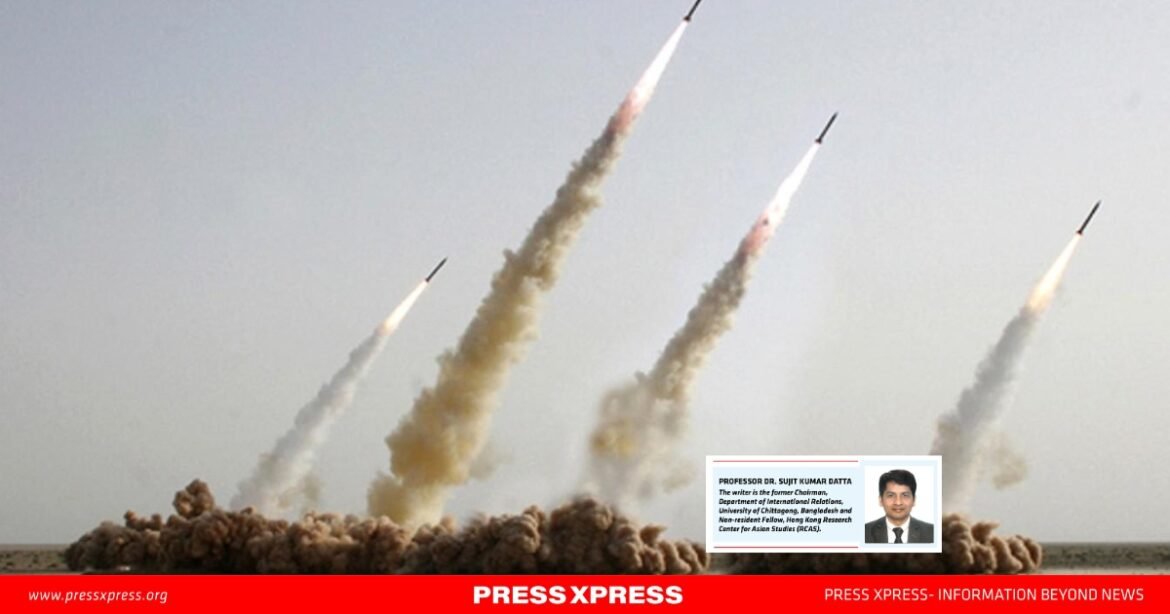In an era of escalating geopolitical tensions, missile diplomacy has become a double-edged sword. On one side, it functions as a strategic instrument of deterrence, allowing countries to safeguard their sovereignty. However, on the other side, it acts as a perilous accelerant in the arms race, destabilizing global tranquillity and security. With nations like China deploying missiles in Pakistan and the United States strengthening its missile presence in the Philippines, questions emerge regarding the long-term implications of missile diplomacy on regional and international stability.
Missile diplomacy refers to states strategically utilizing or threatening missile deployment to accomplish political, military, or diplomatic objectives. Unlike conventional diplomacy, which seeks peaceful negotiations, missile diplomacy operates according to coercion and power projection principles.
Historically, the Cold War serves as a textbook example of missile diplomacy in action, ranging from the Cuban Missile Crisis of 1962 to the deployment of Intermediate-Range Nuclear Forces (INF) in Europe. These instances underscore how missile diplomacy has functioned as both a tool of negotiation and a trigger for heightened tensions. China’s installation of advanced missile systems in Pakistan underscores its growing impact in South Asia. This transfer is perceived as a counterweight to India and a reinforcement of Sino-Pakistani military cooperation under the China-Pakistan Economic Corridor (CPEC).
However, it has exacerbated regional tensions, compelling India to bolster its missile capabilities. On the other side, the United States renewed its focus on the Indo-Pacific, particularly its missile deployments in the Philippines. It aimed to counter China’s assertive behaviour in the South China Sea. This strategic partnership underscores the U.S.’s commitment to its allies and exacerbates regional rivalries, dragging Southeast Asia into the broader geopolitical contest between superpowers.
In addition, North Korea’s frequent missile tests exemplify the coercive aspect of missile diplomacy. By showcasing its expanding missile capabilities, Pyongyang aims to extract concessions from the U.S. and South Korea while simultaneously asserting its strategic autonomy.
Missile diplomacy undermines international cooperation as the deployment of rockets by one nation commonly elicits retaliatory measures from others, starting a vicious cycle of militarization that weakens global efforts for disarmament and nonproliferation. The strategic utilization of missiles regularly triggers an arms race with expanding implications. In South Asia, China’s sponsorship of Pakistan’s missile development has prompted India to heighten its capacities, exacerbating regional tensions.
Similarly, the existence of U.S. missiles in the Philippines compels reactions from China, destabilizing the Indo-Pacific area. Missile diplomacy shrinks the scope for harmonious negotiations. The concentration diverges from dialogue to deterrence, where countries rely on military might to solve disputes, amplifying the risk of unintended or intentional escalation with potentially catastrophic outcomes.
The past half-century has witnessed missile diplomacy’s rising impact worldwide. The United States and China leverage this strategy in Asia, the Middle East, and Eastern Europe, vying for dominance amid geopolitical contests. Smaller nations suffer consequences, compelled into pragmatic alignments regardless of preferences. Proxy conflicts commonly arise through such manoeuvres, as evident from Iran channelling arms, including missiles, to non-state actors in the volatile Levant. Regional actors reciprocate perceived threats through counter deployments, exacerbating cycles of distrust.
Binding treaties offer a framework for moderating escalatory practices. The Intermediate-Range Nuclear Forces Treaty and New Strategic Arms Reduction Treaty prescribed verification and step-by-step denuclearization, setting a precedent. Beyond arms control, trust-building through open dialogue lowers risks of miscalculation. Regular exchanges clarify intentions and capabilities, easing security dilemmas. Faith in cooperative solutions also strengthens via inclusive multilateralism. United Nations-led mediation and codes of conduct customized to local contexts cultivate stability.
The 1962 Cuban Missile Crisis starkly demonstrated missile brinkmanship’s dangers. Soviet placement of missiles ninety miles from Florida and the American blockade’s coercion showed that high stakes were possible. While the crisis was ultimately circumvented, its lessons in restraint and compromise remain salient. Without mitigation, escalation dynamics emerge wherever deterrence through might alone holds sway. A collective commitment to nonviolent conflict resolution offers the surest path toward a resilient international order, ensuring security for all.
Strengthening existing arms control pacts while expanding transparency can ease tensions. Treaties like the INF and New START provide an architecture for visibility and mutual force reductions. However, more work remains. Promoting open dialogue between rivals helps circumvent miscalculations. Confidence-building steps can de-escalate crises, including missile test observation and placing warheads in secure storage facilities. Still, lasting solutions demand addressing core disputes.
The writer is the former Chairman, Department of International Relations, University of Chittagong, Bangladesh and Deputy Director, Hong Kong Research Center for Asian Studies (RCAS)


